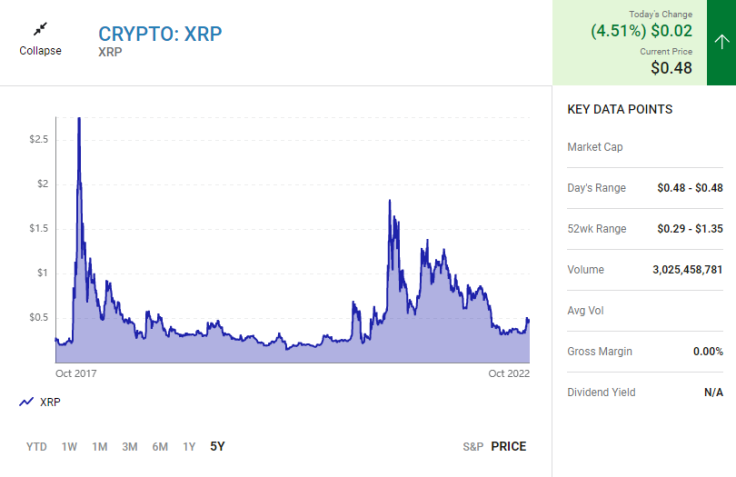Did Kim Kardashian Just Change The Game For Crypto Investors?
KEY POINTS
- The SEC charged Kardashian with not disclosing that her EthereumMax social media post was a paid advertisement
- She settled the matter out of court, so this case won't be able to set legal precedent
- Still, her enormous media exposure could give this settlement an important place in cryptocurrency history
Kim Kardashian may have affected how cryptocurrencies will be treated by American regulators and lawmakers.
She just settled a crypto-related cease-and-desist order from the Securities and Exchange Commission (SEC), which means Kardashian's case won't set a legal precedent. Only proceedings that actually go to court can do that. But the penalty fee of $1.26 million is big enough to turn heads and change minds. That could be enough to shift the direction of future legal proceedings in the cryptocurrency space. Furthermore, the SEC complaint was based on a rather controversial idea that is of fundamental importance to the future of crypto trading and ownership.
Crypto investors of the future may look back at Kardashian's settlement as a turning point in the quest for a solid legal framework around cryptocurrency assets. That could be both good and bad in the long run.
What was the problem?
Kardashian promoted a certain cryptocurrency on her ultra popular Instagram account on June 13, 2021. The post highlighted a coinholder-friendly move by the EthereumMax token, with a link to a promotional video that explained how investors could get their hands on this cryptocurrency.
EthereumMax prices spiked more than 60% higher on the day of this Instagram post. These quick gains faded out over the next week and only continued down from there. EthereumMax is now worth less than 5% of what it was before the Kardashian event. Investors were left holding a large bag of hot air. This self-described "culture token" does not look like a serious investment today.
The SEC paid attention to EthereumMax's sudden surge and its correlation to Kim Kardashian's promotional Instagram post. The agency also found out that she had been paid for this potentially helpful marketing push, but also that neither the post nor the linked video mentioned this fact.
Here's the relevant section of the regulatory enforcement code that was cited in the SEC's complaint, with emphasis added to the troublesome bits: "Any celebrity or other individual who promotes a virtual token or coin that is a security must disclose the nature, scope, and amount of compensation received in exchange for the promotion. A failure to disclose this information is a violation of the anti-touting provisions of the federal securities laws."
Why is that language debatable?
The American legal system has not yet determined whether cryptocurrencies are securities (like a stock or a bond), currencies (like the U.S. dollar or the euro), or somewhere in between. A larger SEC complaint has been going through the courts since December 2020, arguing that Ripple executives raised $1.3 billion in "an unregistered, ongoing digital asset securities offering."
In this case, the alleged security is the Ripple token, XRP (XRP 4.51%). The financial stakes are many orders of magnitude larger than Kardashian's million-dollar settlement, but both complaints hinge on the idea that cryptocurrencies must follow the same rules as investment securities.
The Kardashian case cannot set a legal precedent, but I think it's safe to say that the people who are contemplating actual regulations and precedent-setting court cases will have this nugget of information tucked away in their brains. Given Kim Kardashian's enormous media footprint, you'd have to live under a mossy rock in order not to hear about this settlement. Could it be the straw that breaks the donkey's crypto-regulating back? I don't know, but nothing is impossible.

What's next for Kim Kardashian and crypto investments?
Kim Kardashian is sending a $250,000 check to the SEC as repayment of the promotional fees, another $10,515 to cover interest accrued during the proceedings, and $1 million as a civil penalty. Furthermore, she's not allowed to take payment for giving publicity to any crypto asset in the next three years. This restriction applies whether cryptocurrencies are determined to be securities or currencies in the meantime.
Crypto investors should take note of this case and continue to pay attention to the development of firm crypto-trading rules. This process could go one of several ways:
- All cryptocurrencies are treated as securities, following the model used in the Kardashian case. The industry must then adapt to a metric ton of additional restrictions, making cryptocurrencies comparable to stocks in many ways.
- Every crypto is managed like a fiat currency. There are still rules regarding their movement across international borders, mitigation of money laundering efforts, and other legal concerns, but this rulebook is much thinner than the securities version.
- Each digital asset is judged by a unique standard, sorting them into different buckets of rules depending on what the cryptocurrencies actually do. For example, Bitcoin could be seen as a value-management tool that belongs in the discussion of securities, while Ethereum might pass as a digital currency that should flow more freely between people and businesses -- like the good old dollar.
I don't know where American and international regulators will land on this scale, but I can't wait to find out. Even the most draconian set of rules will be an improvement compared to the loose rules of thumb crypto investors are working with today. Therefore, anything that moves the crypto industry closer to some sort of regulatory certainty should be hailed as a positive step.
This article originally appeared in The Motley Fool.
Anders Bylund has positions in Bitcoin, Ethereum, and XRP. The Motley Fool has positions in and recommends Bitcoin and Ethereum. The Motley Fool has a disclosure policy.

© Copyright IBTimes 2025. All rights reserved.





















